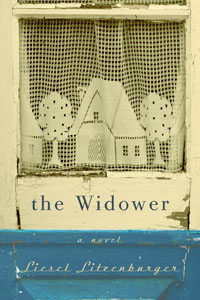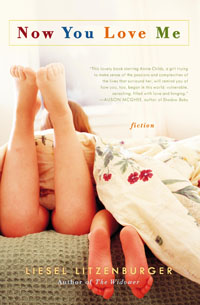Liesel Litzenburger Finds Success with ‘The Widower’, ‘Now You Love Me’
Although Liesel Litzenburger once was hesitant to share her writing with people who weren’t family or friends, she moved past that trepidation to pursue her dream — being a published novelist.
“My shyness was outweighed by my thrill of seeing my name in print,” she said. “That’s sort of the trade off.”
Overcoming that shyness has paid off for Litzenburger, who has published two critically acclaimed novels, “Now You Love Me” and “The Widower.”

Although her novel, “Now You Love Me,” was first published by a small press in 2001, it didn’t garner much attention until it was reedited and republished in 2007 by Three Rivers Press, a Random House division.
“Only my friends and closest relatives read it,” Litzenburger said of the first edition.
Since her other novel, “The Widower,” was released before the revised edition of “Now You Love Me,” the first book she wrote is often considered to be her second.
Now, both novels have received critical acclaim. “Now You Love Me” was recently selected as the “Pick of the Week” by Entertainment Weekly, while “The Widower” was honored with the Stuart D. and Vernice M. Gross Award for Literature and named a 2007 Michigan Notable Book.
Over the years, Litzenburger has received emails from fans throughout the United States, as well as in Europe and South America. Since facing rejection becomes second nature for most writers, Litzenburger said she has been pleased with the reaction to her books, especially her characters.
“I have been really thrilled that both books have gotten so much attention,” said Litzenburger, adding, “you care abut your characters almost as they are family members. If someone said something mean about them, it would almost feel like someone said something mean about your mother.”
To create her characters, Litzenburger draws from snippets of her life that, at the time, often appear insignificant. “That’s the kind of thing that can inspire an entire character, just a line someone says,” she said. “I try to just pay attention to normal, everyday life.”
Litzenburger said her characters tend to be ordinary people who may be easy for readers to relate to. In “The Widower,” Litzenburger explores the lives of two men — Swanton Robey and Joseph Geewa — who have both lived as prisoners. While Swanton Robey is imprisoned by the sorrow over the accidental death of his wife, Joseph Geewa is trying to readjust to living in society after being behind bars for 20 years. The story connects the two, and sends them on a journey together in a “profound story of loss and redemption.”
In “Now You Love Me,” Litzenburger took a different direction by exploring the innocence of youth through the eyes of her main character, Annie, a girl with a matter-of-factness about life. When she started writing the book about a dysfunctional family living in a small, summer-vacation town in Michigan, she realized that the girl’s perspective was the only way possible to capture it.
“Annie’s perspective of the adult world was interesting to me,” explained Litzenburger. “At the time, you really don’t have the language to articulate it, but you abstract it in another way.”

Using the girl as a narrator allowed the author to give a fresh perspective to the story. However, Litzenburger said it can be difficult to see things through the innocent eyes of youth.
“You have to go back before you were jaded or had preconceived notions,” she explained. “As a kid, you really are still open; your mind is open to new ideas and people.”
Although Annie grew up in a similar town as Litzenburger, none of the author’s characters are modeled after her. “Nothing I write has ever literally happened to me,” she said.
However, Litzenburger believes a reader can learn about a writer based on the author’s views throughout the novel. “I think writers often say a lot about themselves in their writing,” said Litzenburger, who added it is easier for her to discuss her work than her personal life. “It’s all about us in a way, because it’s the way we see the world.”
Litzenburger realized her dream of writing a book when she was in junior high school, and it dawned on her that the book she was reading at the time was written by a living, breathing person.
“I somehow made the connection that someone wrote this, and that could be my job,” she recalled.
However, even before that moment, Litzenburger had already developed a passion for writing stories. In the third or fourth grade, Litzenburger wrote her first novel, “The Very Bad Man,” which is a story of a kidnap and espionage plot in Brazil.
Litzenburger said her other passion for the written word — reading — began when she was just a young girl growing up in the mostly summer destination town of Harbor Springs, Michigan. At the time, most homeowners only lived in their properties during the summer months, so Litzenburger entertained herself with reading.
As a child, Litzenburger wasn’t interested in reading the appropriate books for her age. Instead, her mom allowed her to check out books like Truman Capote’s “In Cold Blood,” which she read in the sixth grade. Litzenburger decided in college to pursue writing as a profession. She earned her bachelor’s degree in English at the University of Michigan and her master’s of fine arts degree at Western Michigan University.
After she graduated, Litzenburger spent years dabbling in careers involving writing, including journalism and teaching creative writing. Her experience includes being published in newspapers like the Detroit Free Press and the Chicago Tribune, as well as magazines such as Body+Soul. She has also taught creative writing at the University of Michigan and at New College of Florida.

Litzenburger was raised in a family full of storytellers, so writing fiction has always been nearest and dearest to her heart.
“I think novelists especially are people who would like to imagine an entire world,” she said. “You have to be able to see that world, and know your characters as well as you know your friends or family members.”
In fact, she allows the characters, and not the storyteller, to direct what happens to who and when. “I don’t plan what I am writing in advance,” she explained. “It really unfolds as a surprise to me.”
That practice helps Litzenburger find fulfillment with her writing, especially since “some people really enjoy seeing their writing unfold, like they are watching a film, and that’s the way it is for me.” “They are not puppets, and I am not pulling the strings,” she added.
Litzenburger said writing also allows her to revive her characters. She is doing just that with a book she is currently working on and hoping to complete by the end of the year. “I see all my characters in both my novels living in the same general world, and when I miss them I can bring them back,” she said.
While Litzenburger would love to return to teaching someday and remains interested in freelance non-fiction, she is enjoying the current path that her life has taken.
Said Litzenburger: “It’s really nice when you can just devote your time to your own work.”
Recommend0 recommendationsPublished in Features, Publishing


Responses